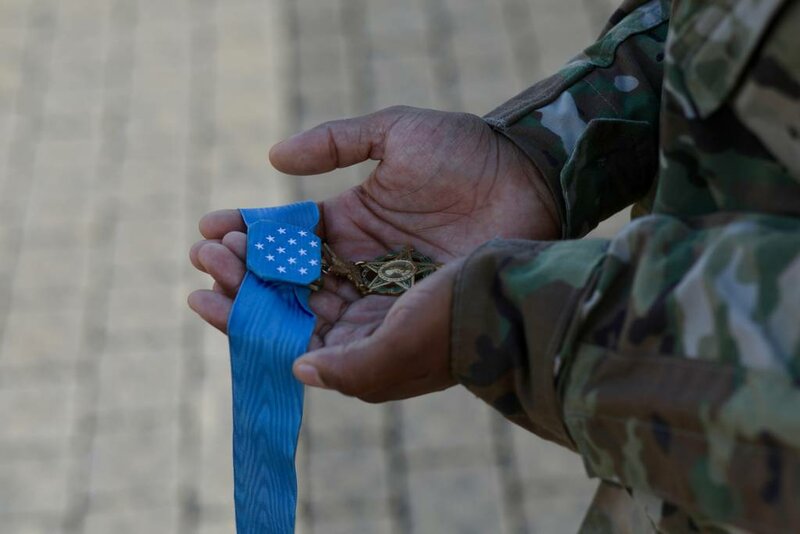Posted on Dec 30, 2021
Congress authorizes Medal of Honor for 5 soldiers and awards upgrade for 4 Black Hawk Down troops...
401
13
2
10
10
0
Edited 4 y ago
Posted 4 y ago
Responses: 2
Congrats to:
Pfc. Charles R. Johnson, who received the Silver Star posthumously in 2011 for his efforts to defend a hilltop outpost in Korea on June 11-12, 1953. Johnson, who was killed in the battle and didn’t initially receive any award, was a member of the 3rd Infantry Division from New York.
Pfc. Wataru Nakamura, a 2nd Infantry Division soldier who received a posthumous Distinguished Service Cross in 1952 after making a “one-man assault” on bunkers recently captured by the enemy before dawn on May 18, 1951. Nakamura, a Japanese-American who was forced to live in an internment camp during World War II, was a former member of the famous 442nd Regimental Combat Team during the previous war.
Pvt. Bruno R. Orig, who posthumously received the Distinguished Service Cross for actions on Feb. 15, 1951 in Korea, when he ran into a firefight, evacuating wounded soldiers and taking over a machine gun position after its crew was hit. Orig’s suppressing fire allowed an entire platoon to retreat, but the 2nd Infantry Division soldier died manning the machine gun.
Staff Sgt. Edward N. Kaneshiro, who saved his platoon from a deadly ambush in Vietnam on Dec. 1, 1966, when he single-handedly assaulted and cleared a trench line and bunkers that were pinning the unit down. A previous recipient of the Silver Star, the 1st Cavalry Division soldier was posthumously awarded the Distinguished Service Cross for the December firefight after he was killed in action in March 1967.
Spc. 5 Dennis M. Fujii, a medical evacuation helicopter crew chief who was left behind, wounded, in Laos amid a massive enemy attack in Feb. 1971. Fujii received the Distinguished Service Cross after coordinating U.S. airstrikes and artillery in defense of a South Vietnamese base there for two days before he could be safely evacuated. Fujii’s actions were later memorialized in the Army’s official history of medevac operations, and he later sat down for an oral history interview about his experience.
Pfc. Charles R. Johnson, who received the Silver Star posthumously in 2011 for his efforts to defend a hilltop outpost in Korea on June 11-12, 1953. Johnson, who was killed in the battle and didn’t initially receive any award, was a member of the 3rd Infantry Division from New York.
Pfc. Wataru Nakamura, a 2nd Infantry Division soldier who received a posthumous Distinguished Service Cross in 1952 after making a “one-man assault” on bunkers recently captured by the enemy before dawn on May 18, 1951. Nakamura, a Japanese-American who was forced to live in an internment camp during World War II, was a former member of the famous 442nd Regimental Combat Team during the previous war.
Pvt. Bruno R. Orig, who posthumously received the Distinguished Service Cross for actions on Feb. 15, 1951 in Korea, when he ran into a firefight, evacuating wounded soldiers and taking over a machine gun position after its crew was hit. Orig’s suppressing fire allowed an entire platoon to retreat, but the 2nd Infantry Division soldier died manning the machine gun.
Staff Sgt. Edward N. Kaneshiro, who saved his platoon from a deadly ambush in Vietnam on Dec. 1, 1966, when he single-handedly assaulted and cleared a trench line and bunkers that were pinning the unit down. A previous recipient of the Silver Star, the 1st Cavalry Division soldier was posthumously awarded the Distinguished Service Cross for the December firefight after he was killed in action in March 1967.
Spc. 5 Dennis M. Fujii, a medical evacuation helicopter crew chief who was left behind, wounded, in Laos amid a massive enemy attack in Feb. 1971. Fujii received the Distinguished Service Cross after coordinating U.S. airstrikes and artillery in defense of a South Vietnamese base there for two days before he could be safely evacuated. Fujii’s actions were later memorialized in the Army’s official history of medevac operations, and he later sat down for an oral history interview about his experience.
(2)
(0)
A long time coming. Blackhawk Down was a huge mess brought about by lack of support from the top, so maybe that’s why the huge delay, embarrassment.
I had a friend that was in Manzanar, then drafted. He never mentioned what it took to make the jump back into society.
I had a friend that was in Manzanar, then drafted. He never mentioned what it took to make the jump back into society.
(1)
(0)
Read This Next



 Medal of Honor
Medal of Honor Valor
Valor


